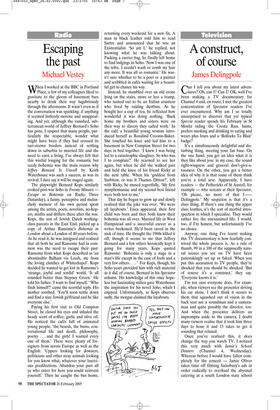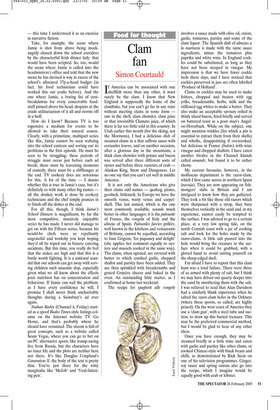A construct, of course
James Delingpole
Can I tell you about my latest adventures? Oh, can I? Can I? OK, well I’ve been making a TV documentary for Channel 4 and, en route, I met the greatest concentration of Spectator readers I’ve ever encountered. Why am I so totally unsurprised to discover that yer typical Speccie reader spends his February in St Moritz riding the Cresta Run, hunts, prefers smoking and drinking to eating and wears plus fours and a ‘Bollocks To Blair’ badge?
It’s a simultaneously delightful and disturbing thing, meeting your fan base. On the one hand, you get an idea what it is they like about you: in my case, the sound right-wingness and general don’t-give-atossness. On the other, you get a better idea of why it is that some of them think you’re a total arse. Apparently, I have readers — the Pethericks of St Austell, for example — who scream at their Spectator, ‘Oh please, no more of that f—— Delingpole.’ My suspicion is that it’s a class thing. If there’s one thing the upper class loathes, it’s the sort of morbid introspection in which I specialise. They would rather live the unexamined life. I would, too, if I’m honest, but unfortunately I’ve no choice.
Anyway, one thing I’ve learnt making this TV documentary is how fearfully contrived the whole process is. As a rule of thumb, 99 in a 100 of the supposedly natural scenes you see on TV have been painstakingly set up or faked. When you put this accusation to TV people, they’re shocked that you should be shocked. ‘But of course it’s a construct,’ they say. ‘Everyone knows it is.’ I’m not sure everyone does. For example, when viewers see the presenter driving his car alone, I don’t think it occurs to them that squashed out of vision in the back seat are a soundman and a cameraman and quite possibly the director, too. And when the presenter delivers an impromptu aside to the camera, I doubt many viewers realise that it took him three days to hone it and 15 takes to get it sounding that relaxed.
Once you’ve realised this, it does change the way you watch TV. I noticed this very much with Jamie’s School Dinners (Channel 4, Wednesday). Whereas before I would have fallen completely for the conceit — Jamie Oliver takes time off filming Sainsbury’s ads in order radically to overhaul the abysmal catering at a south London state school — this time I understood it as an exercise in narrative fiction.
Take, for example, the scene where Jamie is shot from above being mockangrily chased down the school corridors by the characterful Irish dinner lady: that would have been scripted. So, too, would the scene where Jamie is called into the headmistress’s office and told that the new menu he has devised is way in excess of the school’s allocated 37p-a-head budget (in fact, his food technicians could have worked this out yonks before). And the one where Jamie, a boring list of costbreakdowns for every conceivable foodstuff pinned above his head, despairs at the crude utilitarianism of it all and storms off in a huff.
How do I know? Because TV is too expensive a medium for events to be allowed to take their natural course. Clearly, with a primetime, multipart series like this, Jamie cannot be seen waltzing into the school canteen and sorting out its problems in the first episode. He must be seen to be struggling; these periods of struggle must occur just before each ad break; there must be leavening moments of comedy; there must be a cliffhanger at the end. TV cookery docs are notorious for this. A lot of the time — I dunno whether this is true in Jamie’s case, but it’s definitely so with many other big names all the donkey work is done by cookery technicians and the chef simply prances in to finish off the dishes at the end.
For all this, though, I think Jamie’s School Dinners is magnificent, by far the most compulsive, massively enjoyable series he has made. I never did manage to get on with his Fifteen series, because his would-be chefs were so repellantly ungrateful and workshy you kept hoping they’d all be wiped out in bizarre catering accidents. But this time, you really do feel that the stakes are high and that this is a battle worth fighting. It is a national scandal that our schools can get away with serving children such anaemic slop, especially given what we all know about the effects poor nutrition has on concentration and behaviour. If Jamie can nail the problem, as I have every confidence he will, I promise I shall never think uncharitable thoughts during a Sainsbury’s ad ever again.
Nathan Barley (Channel 4, Friday) started as a spoof Radio Times-style listings column on the Internet website TV Go Home, and that’s probably where he should have remained. The sitcom is full of great concepts, such as a website called Scum Vegas, where you can go to bet on un-PC alternative sports like tramp-racing live from Russia, but the characters have no inner life and the plots are neither here nor there. It’s like Douglas Coupland’s Generation X: the body of the text is pretty thin. You’re just there for the witty marginalia like ‘McJob’ and ‘Veal-fattening pen’.

















































 Previous page
Previous page